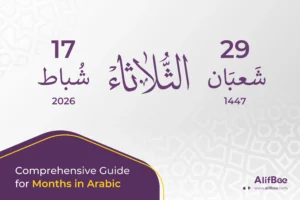After you have learned a few Arabic basics, such as everyday Arabic greetings and some key sentences for different situations, you might think you are ready to start conversing with Arabic speakers. And you will be – but to a certain extent. Even as you add more words and phrases to expand your vocabulary, you still need a crucial element to make your Arabic sound natural to native speakers and to give you the confidence to keep climbing the Arabic proficiency ladder.
Can you guess what that element is? I think you guessed right—that element is Arabic idioms.
Arabic idioms are expressions that carry a meaning you can’t figure out by looking at the individual words, just like “a piece of cake” or “once in a blue moon” in English. There’s no actual cake, and the moon isn’t really blue! In the same way, Arabic is full of beautiful idioms that spark curiosity and invite learners to explore their cultural depth.
So, in this article, I’ve picked 12 must-know Arabic idioms for intermediate learners and beyond. These can be easily used in everyday conversations. So get ready to spice up your language with these beautiful Arabic expressions, learn their correct pronunciation, and use them in the right context.
Why Learning Arabic Idioms Matters
In any language, idioms are similar to proverbs in that they complement and enrich the language. But while proverbs can offer a certain wisdom or originate from a true story, many idioms have intriguing metaphors and vivid imagery to convey complex ideas.
Here’s the thing: you can memorize a thousand Arabic words, and still end up sounding like Google Translate on a bad day. Why? Because real conversations don’t always follow the dictionary. Native speakers throw in idioms, expressions, and little cultural nuggets that make the language feel alive. Miss those, and you’ll catch the words but miss the meaning.
Think of it this way: in English, you don’t literally “spill beans” or “break ice.” Imagine explaining those literally—people would look at you like you dropped your lunch. Arabic works the same way. If you skip idioms, you’ll always feel like something’s missing, even if your grammar is flawless.
12 Common Arabic Idioms for Everyday Conversations
We’ll see 12 Arabic idioms with English translation, examples sentences and explanation of the right context to use them.
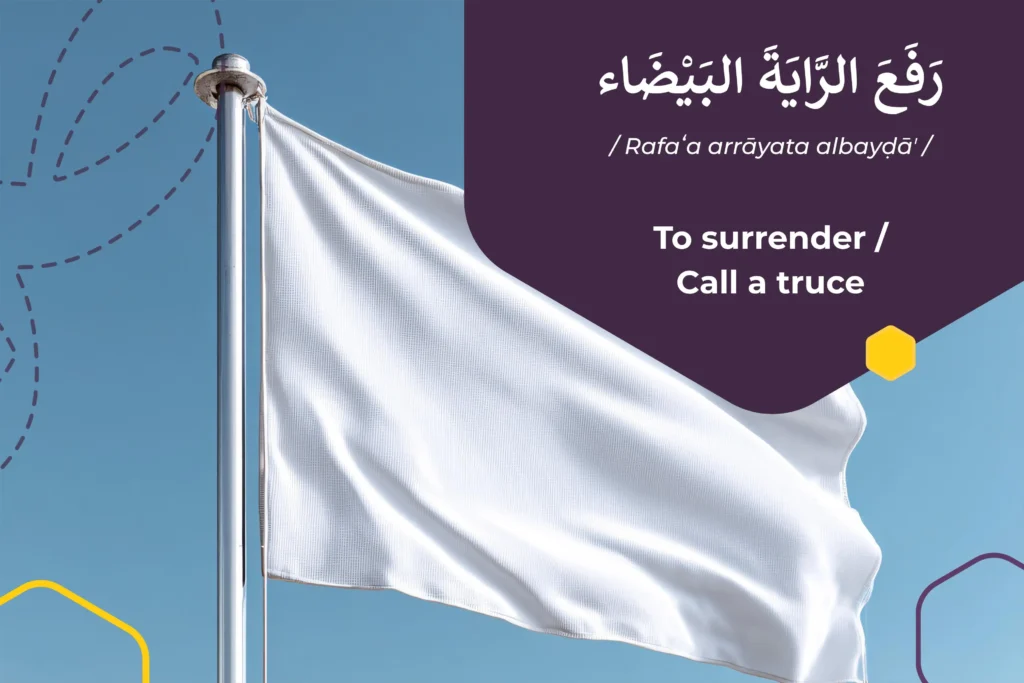
Rafaʻa arrāyata albayḍāʼ - رَفَعَ الرَّايَةَ البَيْضَاء
English Equivalent
Literal Translation
Pronunciation
Arabic Idiom
To surrender / call a truce
To raise a white flag
Rafaʻa arrāyata albayḍāʼ
رَفَعَ الرَّايَةَ البَيْضَاء
Example
English Translation
Pronunciation
Arabic Sentence
The man gave up his opinion and raised the white flag after a long debate. (i.e., he surrendered).
Tanāzala alrrajlu ʻan raʼyhi wrafaʻa arrāyata albayḍāʼa baʻda jidālin ṭawīl.
تَنَازَلَ الرَّجلُ عن رَأيهِ ورَفَعَ الرَّايَةَ البَيْضَاءَ بَعْدَ جِدَالٍ طَوِيل.
The Arabic idiom Rafaʻa arrāyata albayḍāʼ is used in the figurative sense to mean surrendering or giving up on resisting in a given situation, be that literally in the battlefield, or more commonly, to talk about backing down in an argument. It is heard both in MSA and regional dialects like the Levantine dialect.
The imagery comes from warfare. For centuries, the white flag has been used as a global symbol for surrender and asking for military attacks to cease.
Today, the idiom can be used more lightly, such as admitting defeat in a debate or signaling that you’ve stopped resisting a point.
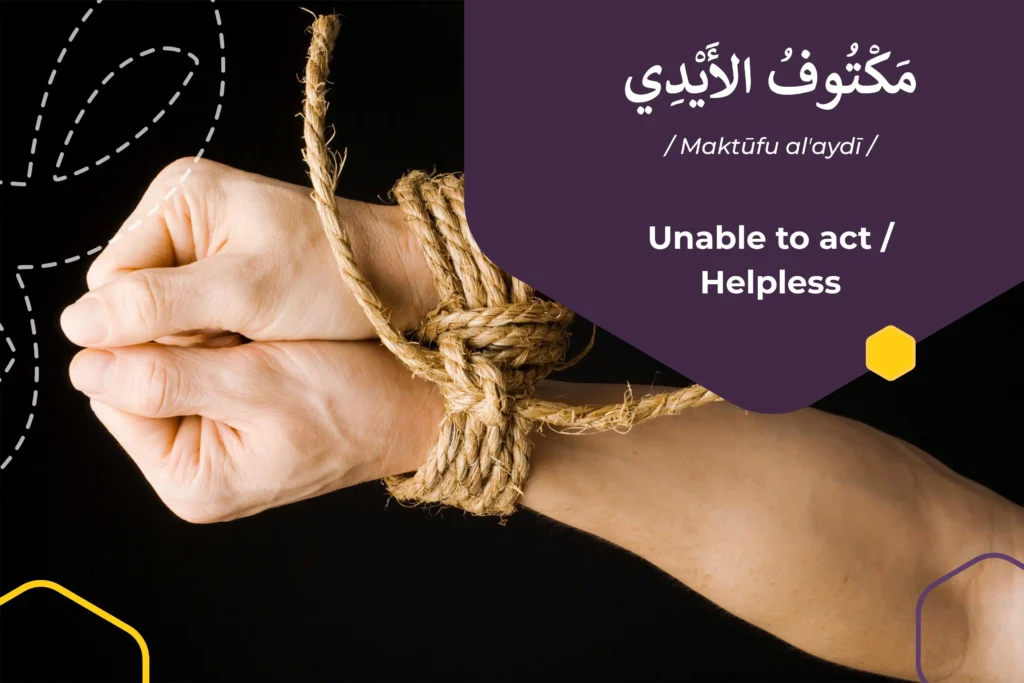
Maktūfu alʼaydī - مَكْتُوفُ الأَيْدِي
English Equivalent
Literal Translation
Pronunciation
Arabic Idiom
Unable to act / helpless
Hands are tied
Maktūfu alʼaydī
مَكْتُوفُ الأَيْدِي
Example
English Translation
Pronunciation
Arabic Sentence
Don’t stand with hands tied (idly by) in front of others’ suffering.
Lā taqif maktūfa alʼaydī amāma muʻānāti alʼākharīn.
لا تَقِفْ مَكْتُوفَ الأَيْدِي أَمَامَ مُعَانَاةِ الآخَرِين.
This is a very common expression often heard in Modern Standard Arabic (MSA). The word maktūf is an adjective that means “tied up.” It comes from the image of prisoners who have their hands tied behind their backs. The image clearly indicates helplessness and the inability to act, especially in serious situations where action is needed.
With an identical idiom in English, “my hands are tied,” it won’t be a problem to use it in the right context. It can be used to describe people as well as entities, like a government that, instead of taking measures to solve a problem, simply watches passively.

Khafīfu aẓẓil - خَفِيفُ الظِّل
English Equivalent
Literal Translation
Pronunciation
Arabic Idiom
Witty / charming / good sense of humor
Having a light shadow
Khafīfu aẓẓil
خَفِيفُ الظِّل
Example
English Translation
Pronunciation
Arabic Sentence
Students enjoy the teacher’s lessons if he is fun and pleasant.
Yastamtiʻu alṭṭulābu bidurūsi almuʻallimi idhā kāna khafīfa aẓẓil
يَسْتَمْتِعُ الطُّلابُ بِدُرُوسِ المُعَلِّمِ إذَا كَانَ خَفِيفَ الظِّل.
Literally, this idiom means “having a light shadow.” When someone is described as khafīfu aẓ-ẓill, it means they’re pleasant, easy to be around, and have a light, charming presence.
Arabic also has an idiom with the opposite meaning: thaqīlu aẓ-ẓill (ثقيل الظل), which literally translates to “ having a heavy shadow”. It is the polite way of saying someone is annoying or awkward.
In English, the closest match would be calling someone “fun to be around” or saying they have a “light-hearted personality.” It is always a compliment to say someone has a light shadow in Arabic. So you can use it comfortably with your fun friends.
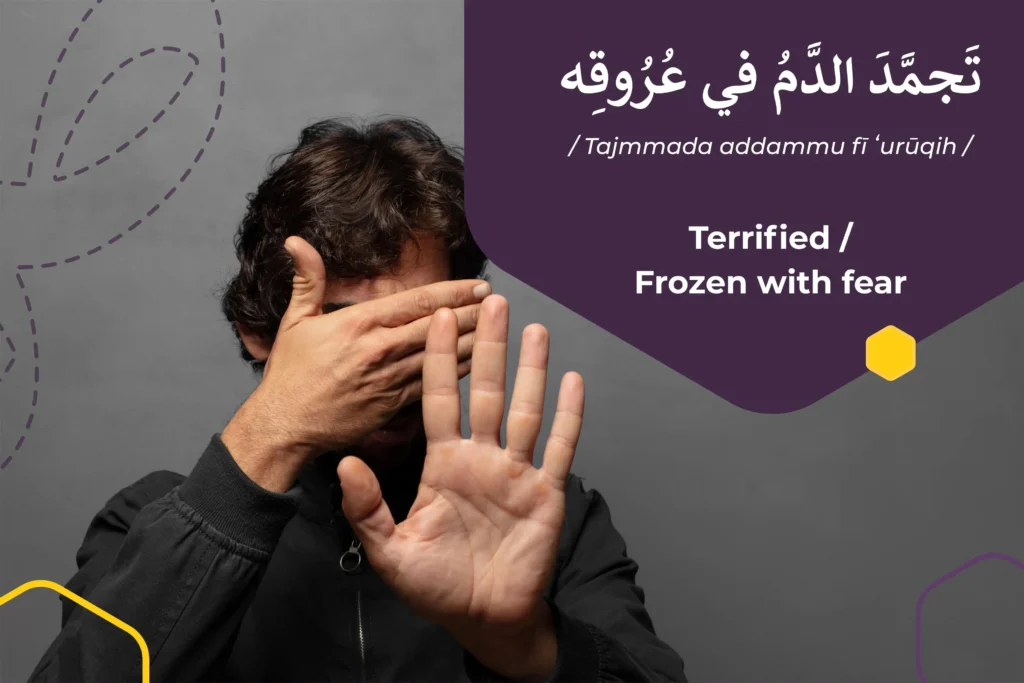
Tajmmada addammu fī ʻurūqih - تَجمَّدَ الدَّمُ في عُرُوقِه
English Equivalent
Literal Translation
Pronunciation
Arabic Idiom
Terrified / frozen with fear
Blood froze in his veins
Tajmmada addammu fī ʻurūqih
تَجمَّدَ الدَّمُ في عُرُوقِه
Example
English Translation
Pronunciation
Arabic Sentence
His blood froze from fear that night.
Tajmmada addammu fī ʻurūqihi mina alkhawfi fī tilka alllaylat.
تَجمَّدَ الدَّمُّ في عُرُوقِهِ مِنَ الخَوفِ في تِلْكَ اللَّيلَة.
Our fourth Arabic idiom is commonly used to describe feelings of intense fear and terror. It literally translates to “His blood froze in his veins.” The image is quite vivid, and it is possibly inspired by the natural reaction of our bodies when we are scared; we feel unable to move.
This idiom is used in literary writing or narratives. So, you don’t usually hear it in this exact wording in everyday colloquial Arabic, but you might hear a similar variation in Levantine Arabic: Itjammad min elkhūf (اِتجَمَّد مِن الخُوف) which means “He froze from fear”.

Ibnu assabīl - ابنُ السَّبِيل
English Equivalent
Literal Translation
Pronunciation
Arabic Idiom
Wayfarer / traveler
The son of the road
Ibnu assabīl
ابنُ السَّبِيل
Example
English Translation
Pronunciation
Arabic Sentence
The villagers helped the wayfarer who had lost his way.
Sāʻada ahlu alqaryti Ibna assabīli alladhī ḍalla ṭarīqah.
سَاعَدَ أَهْلُ القَريةِ ابنَ السَّبِيلِ الَّذِي ضَلَّ طَرِيقَه.
This expression means “wayfarer” or “traveler.” It paints the image of someone who belongs to the road itself. In Arabic and Islamic tradition, it describes a person who has left his home, family, and resources behind and is now far from his place of residence.
The Qur’an mentions ibnu as-sabīl among those entitled to receive zakāt (charitable almsgiving). In Surah At-Tawbah (9:60), the wayfarer is listed alongside the poor, the needy, and others in need of support.
This shows the compassion built into the language: travelers often find themselves vulnerable, without their usual safety net, and the community is encouraged to help them.
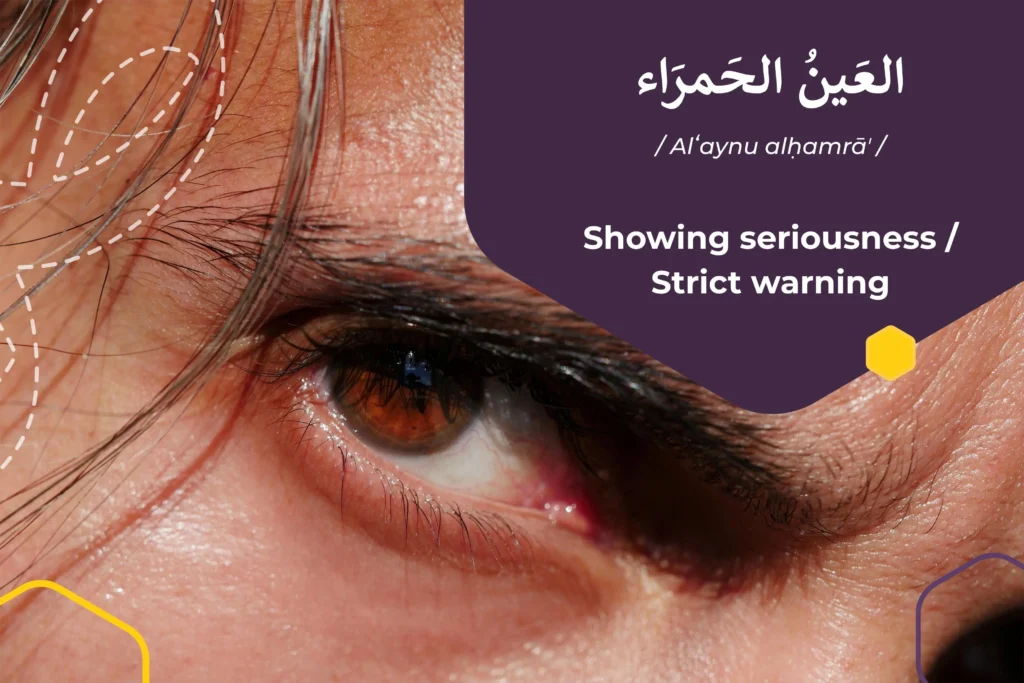
Alʻaynu alḥamrāʼ - العَينُ الحَمرَاء
English Equivalent
Literal Translation
Pronunciation
Arabic Idiom
Showing seriousness / strict warning
The red eye
Alʻaynu alḥamrāʼ
العَينُ الحَمرَاء
Example
English Translation
Pronunciation
Arabic Sentence
The manager showed the red eye (strictness) to the careless employee.
Aẓhara almudyru alʻayna alḥamrāʼa llmwẓẓafi almustahtir.
أَظْهَرَ المُديرُ العَينَ الحَمرَاءَ للموظَّفِ المُستَهتِر.
This Arabic idiom is used to show seriousness or to give a strict warning. When someone “shows the red eye,” it means they are no longer being lenient—they are ready to be firm, tough, or even intimidating.
The image comes from everyday human behavior. When people are angry or determined, their eyes may appear red, whether from stress, sleeplessness, or intensity. In Arabic culture, this “red eye” became a symbol of someone who is no longer joking or negotiating gently, but laying down authority.
In English, the closest equivalent would be something like “I put my foot down” or “I showed him I wasn’t kidding.”
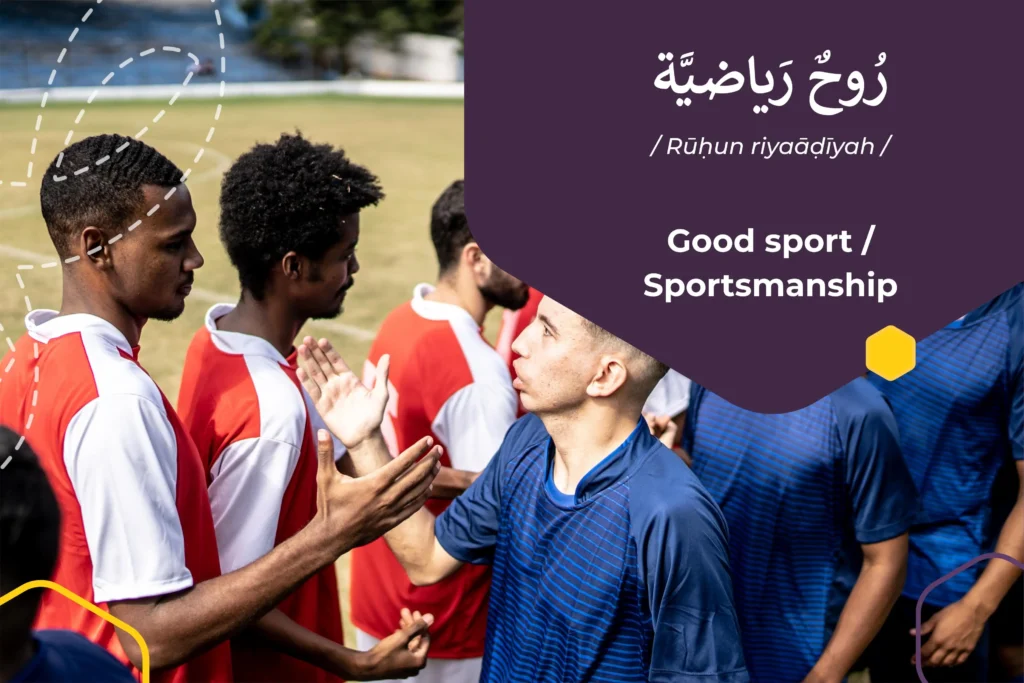
Alkuratu fī malʻabika - الكُرَةُ في مَلعَبِك
English Equivalent
Literal Translation
Pronunciation
Arabic Idiom
It’s your decision now
The ball is in your court
Alkuratu fī malʻabika
الكُرَةُ في مَلعَبِك
Example
English Translation
Pronunciation
Arabic Sentence
I’ve presented you with the possible solutions—now the ball is in your court.
Qaddamtu laka alḥulwla almumkinata, wa-al-ān alkuratu bimalʻabika
قَدَّمْتُ لَكَ الحُلولَ المُمكِنَةَ، والآن الكُرَةُ بِمَلعَبِك.
This idiom is one of the Arabic expressions that is borrowed directly from the world of sports. Literally, it means “the ball is in your playing field.” Figuratively, it’s used to tell someone: “It’s your decision now,” or “The next move is up to you.”
Just as in tennis or football, once the ball is on your side, you’re the one who must act. In conversation, Arabs use this phrase when they’ve done their part and are waiting for the other person to respond, decide, or take responsibility.
In English, the direct equivalent is exactly the same: “The ball is in your court.”
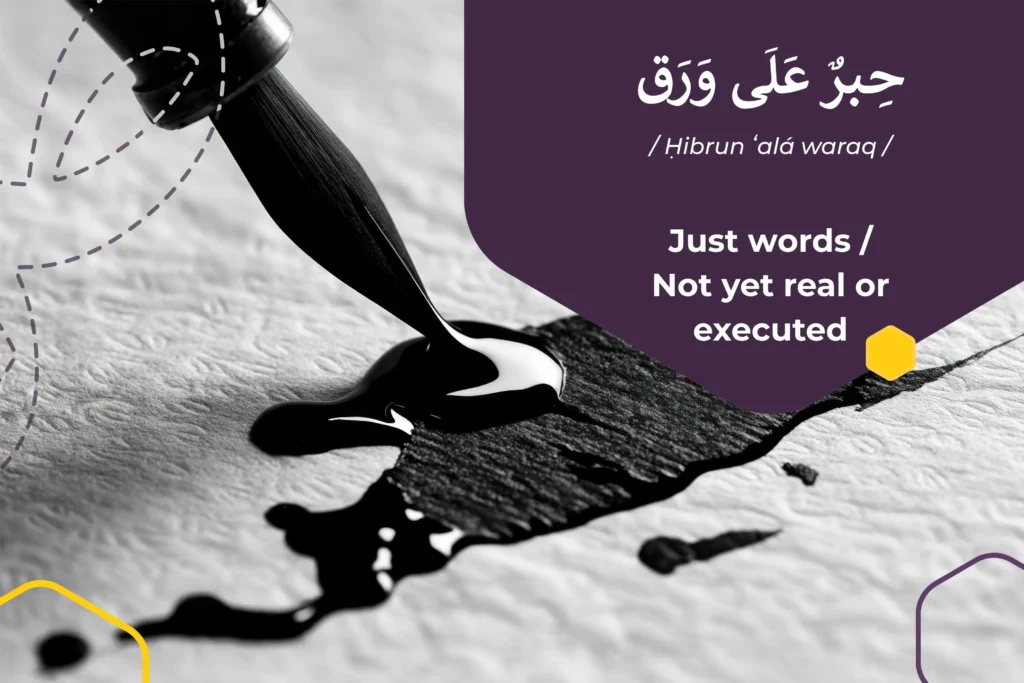
Ḥibrun ʻalá waraq - حِبرٌ عَلَى وَرَق
English Equivalent
Literal Translation
Pronunciation
Arabic Idiom
Just words / not yet real or executed
Ink on paper
Ḥibrun ʻalá waraq
حِبرٌ عَلَى وَرَق
Example
English Translation
Pronunciation
Arabic Sentence
The agreement remained just ink on paper between the two parties.
Baqiyat alʼtifāqīyatu mujrrada ḥibrin ʻalá warqin bayna aṭṭarfiayn.
بَقِيت الإتِفَاقِيَّةُ مجرَّدَ حِبرٍ على وَرقٍ بَينَ الطَّرفَِين.
Not every plan or promise turns into reality. In Arabic, when people want to highlight this gap between words and action, they use the expression ḥibrun ʿalá waraq — literally, “ink on paper.”
The meaning is straightforward: something has been written, agreed on, or announced, but it remains only a formality. Nothing has actually happened yet. You’ll often hear this idiom in conversations about politics, projects, or even everyday promises that sound nice but never get delivered.
In English, the closest match would be “empty words,” “all talk,” or “just a paper promise.”
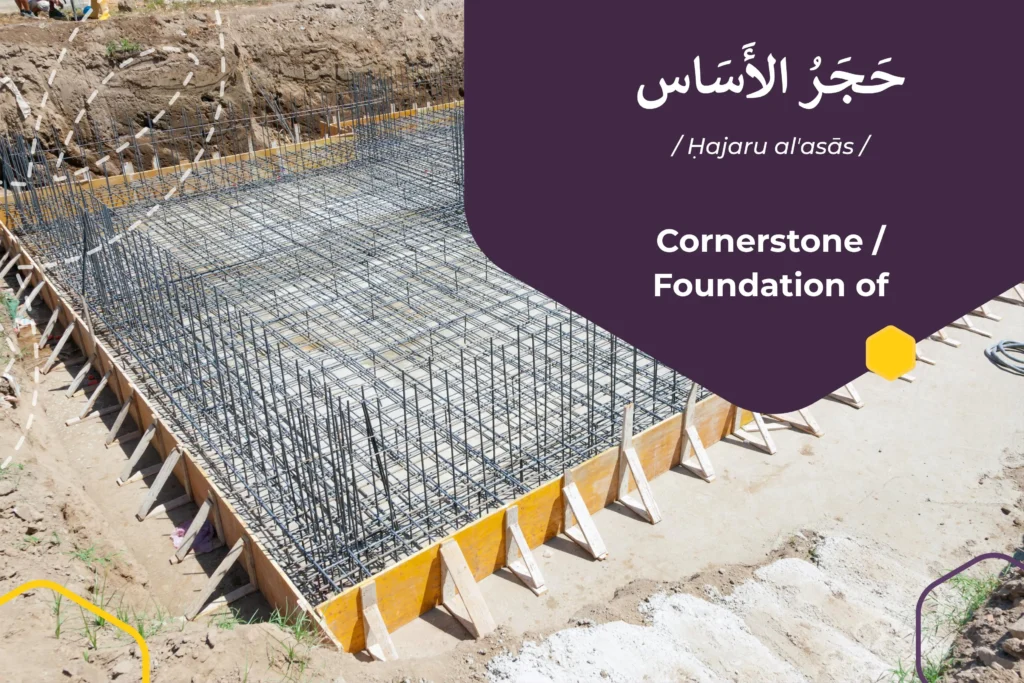
Ḥajaru alʼasās - حَجَرُ الأَسَاس
English Equivalent
Literal Translation
Pronunciation
Arabic Idiom
Cornerstone / foundation of
The foundation block
Ḥajaru alʼasās
حَجَرُ الأَسَاس
Example
English Translation
Pronunciation
Arabic Sentence
The manager laid the foundation stone for the new company department.
Waḍaʻa almudīru ḥajara alʼasāsi llqismi aljadīdi fī ashsharikah.
وَضَعَ المُدِيرُ حَجَرَ الأَسَاسِ للقِسْمِ الجَدِيدِ في الشَّرِكَة.
Every strong building starts with a solid foundation, and Arabic captures this idea in the expression ḥajaru al-asās, literally “the foundation stone” or “cornerstone.”
Figuratively, it’s used to describe the most important element on which everything else depends. This could be a principle, a rule, or even a person who holds things together. Without this “foundation stone,” the whole structure—whether it’s a building, a project, or an idea—would collapse.
In English, the closest equivalents would be “cornerstone,” “foundation,” or “the bedrock of.”
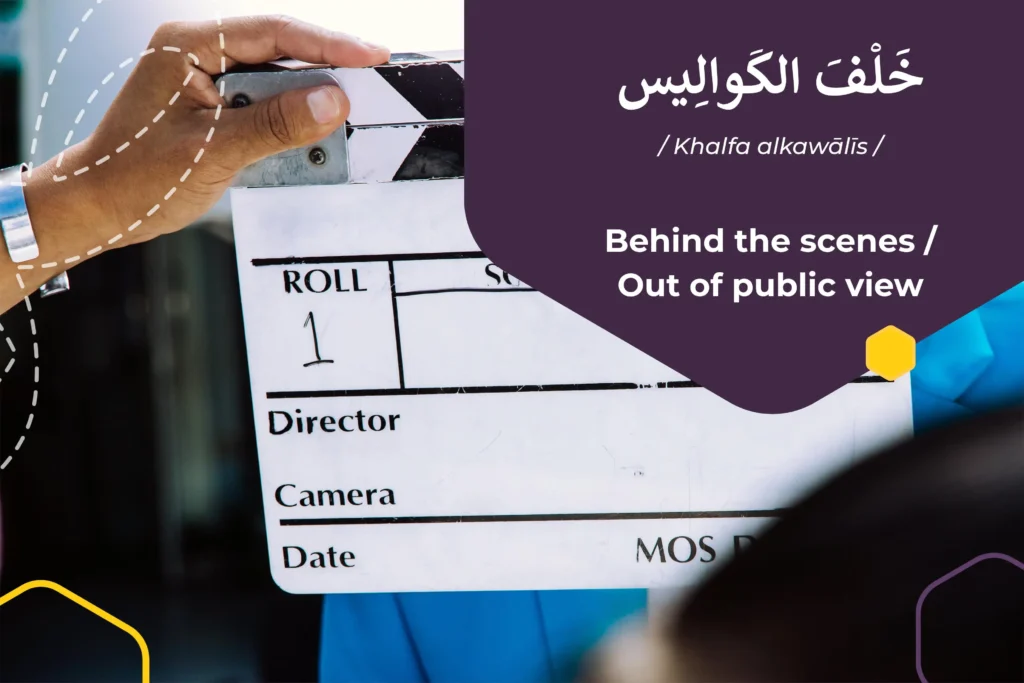
Khalfa alkawālīs - خَلْفَ الكَوالِيس
English Equivalent
Literal Translation
Pronunciation
Arabic Idiom
Behind the scenes / out of public view
Behind the scenes
Khalfa alkawālīs
خَلْفَ الكَوالِيس
Example
English Translation
Pronunciation
Arabic Sentence
There was a lot of hard work behind the scenes that led to this success.
Hunāka taʻabun kabīrun khalfa alkawālīsi athmara hdhā alnnajāḥ.
هُنَاكَ تَعَبٌ كَبِيرٌ خَلفَ الكَوالِيسِ أَثْمَرَ هذَا النَّجَاح.
This is one of the common idioms in Arabic. Khalf al-kawālīs literally means “behind the curtains.” Just as in a theater, where the real preparation happens out of sight, the idiom is used to describe things that take place out of public view.
It often refers to hidden efforts, private discussions, or arrangements that the audience—or the public—doesn’t see.
In English, the match is almost exact: “behind the scenes.” Both carry the sense that what you see on the surface is only part of the story, and the real work is happening elsewhere.
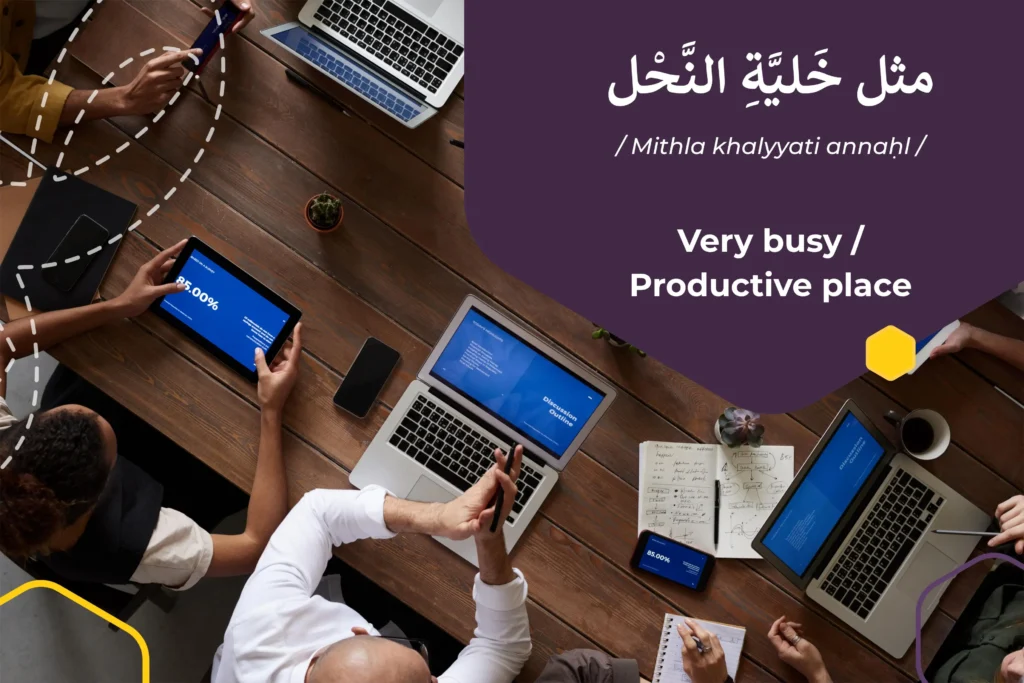
Mithla khalyyati annaḥl - مثل خَليَّةِ النَّحْل
English Equivalent
Literal Translation
Pronunciation
Arabic Idiom
Very busy /productive place
Like a beehive
Mithla khalyyati annaḥl
مثل خَليَّةِ النَّحْل
Examples
English Translation
Pronunciation
Arabic Sentence
Employees in this company work like a beehive.
Yʻmlu almūẓẓafūna fī hadhihi ashsharikati mithla khalīyati alnnaḥl.
يعملُ المُوظَّفُونَ في هَذِهِ الشَّرِكَةِ مِثْلَ خَلِيَّةِ النَّحْل.
When Arabs want to describe a place that’s buzzing with activity, they compare it to a beehive. The idiom mithla khaliyati an-naḥl literally means “like a beehive,” and it captures the image perfectly: people moving quickly, each with a role to play, creating a scene full of energy and productivity.
You might hear this phrase used for a busy marketplace, a crowded office, or even a home before a big celebration. The English equivalent is almost identical: “like a beehive” or “buzzing with activity.” Both point to a space where everyone is active and things are getting done.

Rūḥun riyaāḍīyah - رُوحٌ رَياضيَّة
English Equivalent
Literal Translation
Pronunciation
Arabic Idiom
Good sport/sportsmanship
Sport spirit
Rūḥun riyaāḍīyah
رُوحٌ رِياضيَّة
Example
English Translation
Pronunciation
Arabic Sentence
The employee accepted the feedback with sportsmanship and aimed to improve his performance.
Istaqbala almūẓẓafu almulāḥaẓāti birūḥin riyaāḍīyatin wsaʻá litaḥsīni adāʼih.
اسْتَقْبَلَ المُوظَّفُ المُلَاحَظَاتِ بِرُوحٍ رِيَاضِيَّةٍ وسَعَى لِتَحسِينِ أَدائِه.
Our final idiom in Arabic is used to describe someone who accepts both winning and losing with grace. If you have a rūḥ riyāḍīyah, that means you show fairness, respect, and a good attitude in competition or even in everyday disagreements.
Interestingly, although the expression comes from the world of sports, Arabs often use it in daily life outside the stadium. For example, in family arguments, classroom debates, or workplace discussions, telling someone to show rūḥ riyāḍīyah encourages them to stay calm and handle the outcome with dignity.
Tips for Using Arabic Idioms Correctly
Learning Arabic idioms and proverbs is one thing; knowing how to use them naturally is another. Here are some tips to help you get it right:
- Choose the right context. Make sure the idiom fits the situation so it sounds natural.
- Pay attention to grammar and vowels (ḥarakāt). Small changes can affect meaning.
- Check for prepositions. Some idioms require specific prepositions with certain verbs (see Idiom No. 12 as an example).
- Practice pronunciation. Say the idiom out loud until it feels comfortable.
- Use it in your own examples. Try it in a few sentences before using it in real conversations.
- Listen for idioms in action. Pay attention to how native speakers use them in shows, interviews, or daily talk.
Final word
Idioms are a necessary addition to your vocabulary if you want your Arabic to sound natural. They can also add a deeper meaning to the idea you are putting forward.
We have covered 12 Arabic idioms with translation, seen them in example sentences and learned about the right situation to use them.
You don’t need to learn all of the Arabic idioms we covered here at once. Start with one idiom a day, practicing pronunciation and proper context and try with examples.
Remember that idioms are the shortcuts to sounding natural. They add color and a sense of belonging. They let you not just “speak Arabic,” but live in it. And yes, sometimes you’ll mess one up, use it at the wrong time, or make your Arab friend laugh harder than you intended, but that’s the fun of learning.
If you are still struggling with basic vocabulary and sentence structure and have no time for online Arabic courses, get your hands on the AlifBee app, and start practicing from the comfort of your home, and at your own pace. It has plenty of exercises designed to build your confidence step by step.







